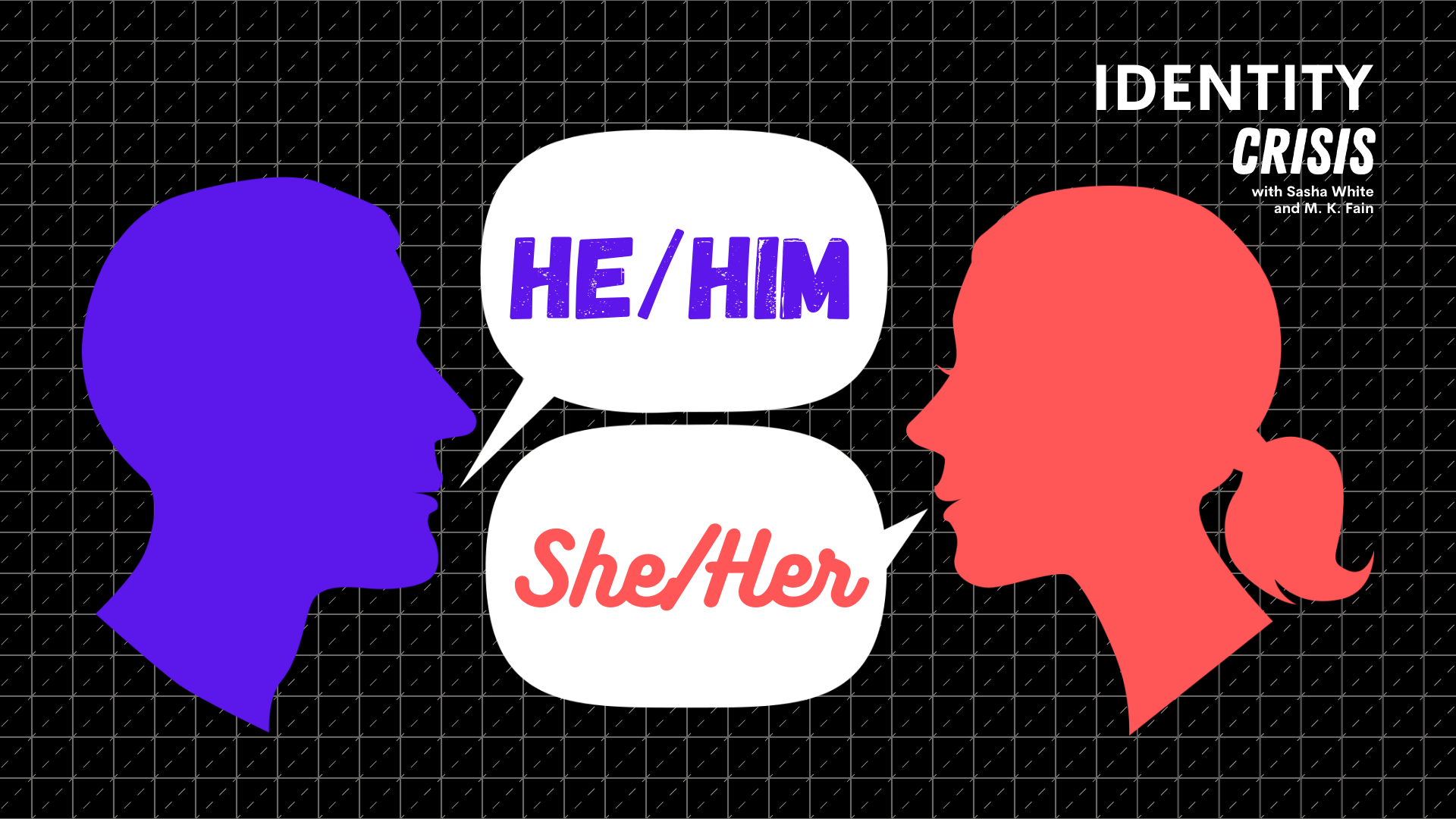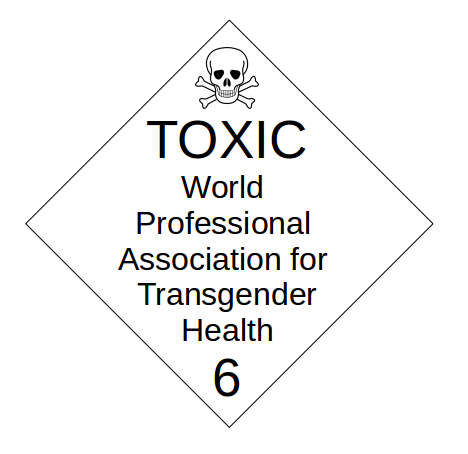Identity Crisis: "What Are Your Pronouns?"
How to answer the dreaded question and exert your boundaries

"Identity Crisis" is a new weekly column and podcast for young people struggling with the modern orthodoxy of gender identity ideology—developed in collaboration between Plebity and 4W by M. K. Fain and Sasha White. Each week, we will answer one or two of your questions, both as a running column here on 4W, and in the form of a video on YouTube.
To submit a question, email us at: [email protected]. We may publish your question in full, so be sure to leave out or change any identifying details if you would like to remain anonymous. Or, specify that your question is private and you would rather we discuss it in a general way.
For a gender critical young woman trying to survive in a liberal or "woke" community, there is perhaps no more dreaded question than "What are your pronouns?" This simple question has become a minefield, and everyone is afraid to say the wrong thing.
There are many reasons someone may not want to share their pronouns. For some, the question is an unwelcome reminder of an internal identity struggle they're not quite ready to share with the world. For feminists, pretending we need to ask to know what sex someone is contributes to the mass gaslighting of women by normalizing the idea that we can not trust what our senses tell us about someone's sex.
For women in situations where they may not want to reveal or draw attention to their sex, such as in online communities or in professional communications, being forced to state your pronouns can mean outing yourself or putting yourself at risk of harassment or discrimination. Take, for example, the study which found that women's code was more likely to be accepted into projects on Github, but only when their sex was not known.
Being forced to identify as "she/her" for women can even perpetuate stereotype threat—a psychological phenomenon where groups are at risk of performing in accordance with a negative group stereotype when that group identity is emphasized. For example, research found that women who were reminded of their sex prior to taking a math test performed worse on the test than women who did not receive this intervention.
Policies requiring you share your pronouns or use specific pronouns for someone else in the workplace or in educational settings are also a form of compelled speech, and are increasingly being pushed by government agencies despite the many First Amendment concerns.
Whatever your reason is for resisting the "pronoun question," the problem of how to answer it remains.
Tactic 1: Ignore the question
Ignoring the pronoun question altogether works in a surprising majority of cases, especially in large group settings where people are asked to introduce themselves in a "circle" (the infamous "pronoun circle"). If you simply skip stating your pronouns in these situations, most people won't notice. If someone does notice, they may feel awkward interrupting to ask you or pick up on the fact that you may not want to share your pronouns.
However, there are definitely times when ignoring the question can end up drawing more attention than you may hope. One young detransitioner shared her story of an awkward pronoun situation on Spinster:
So today was our first day of class (on zoom) and our professor had us do introduction things- Name, pronouns, field we want to work in, hobbies. And I was like Fuck I don't want to play along with this. So by the time it came to be my turn I skipped the pronoun question, tried to be extra bubbly on the others so she wouldn't notice or care.... But at the end of my intro the professor said "and what about your pronouns? Did you skip that on purpose?"
And I said "ahhh um I just don't care," cause I panicked and then thought shit she'll interpret that as me being one of those he/she/them/it people, and so I followed up with "that question just brings up bad memories for me".
And she awkwardly said "oh gotcha..." and hastily moved on to the next person. Definitely looked like a cornered animal lol.
Well after that class was over I had a different zoom class with the same professor. And before class started she PMed me saying "I am sorry about asking for pronouns. I did not know it would be triggering and sincerely apologize. Thank you for being honest about it. :)". And for the intros in this class she had us do name, field of study, and hobbies... but NO pronouns!
In this instance, the bravery of one young woman in ignoring the question, and then speaking out honestly when pushed on it, had a positive impact on the rest of that professor's classes going forward.
Tactic 2: Indicate you don't care about pronouns
There are a variety of ways to indicate that you do not wish to partake in a pronoun question without entirely ignoring it, and options range from being very vague to explicit in your response.
"I don't care about pronouns"
"Any pronouns are fine"
"Use whatever pronouns feel for natural to you"
Or, if you prefer the class-clown route, try making a joke:
"I don't consent to you all talking about me behind my back, so you have no need for my pronouns."
The downside to this tactic is that some people, especially in very "woke" circles, may interpret this as meaning you are non-binary or some other variety of gender-special, especially if you are gender-nonconforming in some way. Butch lesbians, for example, may find themselves being reclassified as men by "woke" misogynists who assume that a woman can not be gender-nonconforming and still be fully female.
If you want to avoid this, try simply stating your sex instead of mentioning pronouns at all. This has the added benefit of calling attention to how silly the whole concept is—everyone is already perfectly capable of identifying your sex without your help.
"I am a woman"
Tactic 3: Be honest about why you find the question harmful
At a certain point, though, it may start to make sense to just be honest about your opposition to the question. This can be especially true in professional settings, where HR departments are sensitive to anything that could be perceived as discrimination or offensive.
When you are honest about your reasons for objecting to stating pronouns, you could be also helping all of the other women who come after you.
Here are some example ways you can phrase your objection:
"I actually prefer not to include my pronouns in professional emails due to the disparate treatment of women in tech and the associated risk of stereotype threat. Thank you for understanding."
"I object to sharing my pronouns because it is harmful to women to constantly raise awareness of our sex in professional settings."
"I think we should stop asking for people to share their pronouns in this group because it forces people like me into uncomfortable positions. If someone wants to share their pronouns with us, they are welcome to and don't need prompting."
"I don't want to share my pronouns with you because I do not see it as my place to compel your speech. I'm confident you already know how to refer to me based on my sex and your understanding of the English language."
Get comfortable with setting personal boundaries and being honest
At the heart of the pronouns dilemma, though, is an underlying problem that extends far beyond whether or not you are a "she/her" or "they/them." For young people, and young women in particular, being comfortable and confident enough to exert your truth and your boundaries is a skill that requires practice to learn—especially when you grow up in a society that does everything it can to break those boundaries down.
In our teens and early twenties, we are so afraid of being disliked by others that we are willing to sacrifice a piece of ourselves to fit in. Learning to exert your boundaries confidently and compassionately, and letting go of the fear of being disliked, is the first step to freedom from the tyranny of others.
Of course, being disliked is often not the only thing at risk. As we well know, women are fired, harassed, and attacked for speaking out against gender ideology. If you need to go along with a "pronoun circle" to keep your job, keep yourself or your family safe, or avoid mental stress you're not equipped to handle right now—that's okay, too. Knowing when you are okay with speaking out and when you prefer to fly under the radar is part of knowing and exerting your boundaries, which is one of the most powerful things a woman can do.

You can listen to "Identity Crisis" on Spotify, Google Podcasts, or wherever you get your podcasts. Subscribe to updates on Identity Crisis here: identitycrisis.xyz/get-updates
Enter your email below to sign in or become a 4W member and join the conversation.
(Already did this? Try refreshing the page!)





Comments